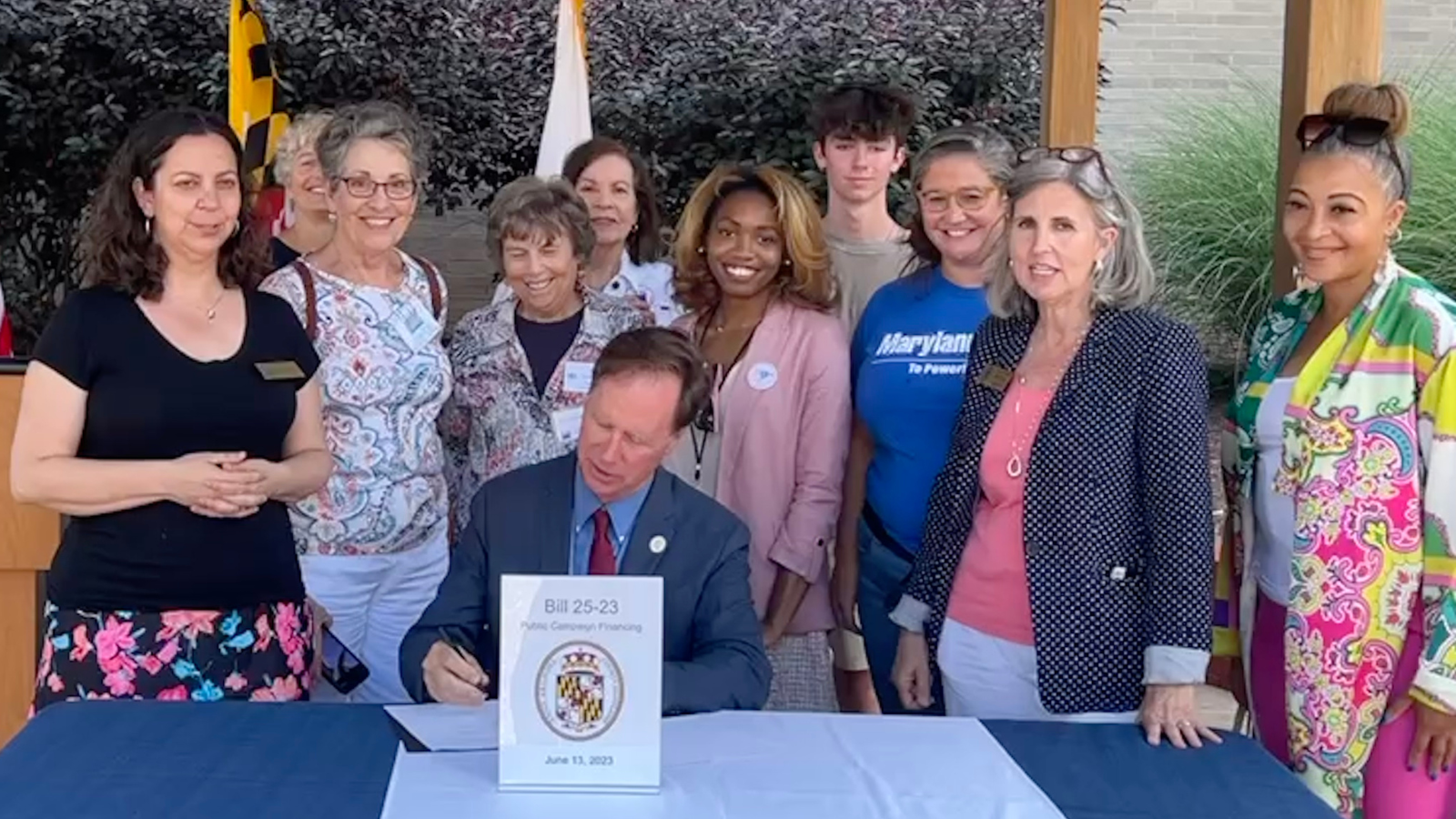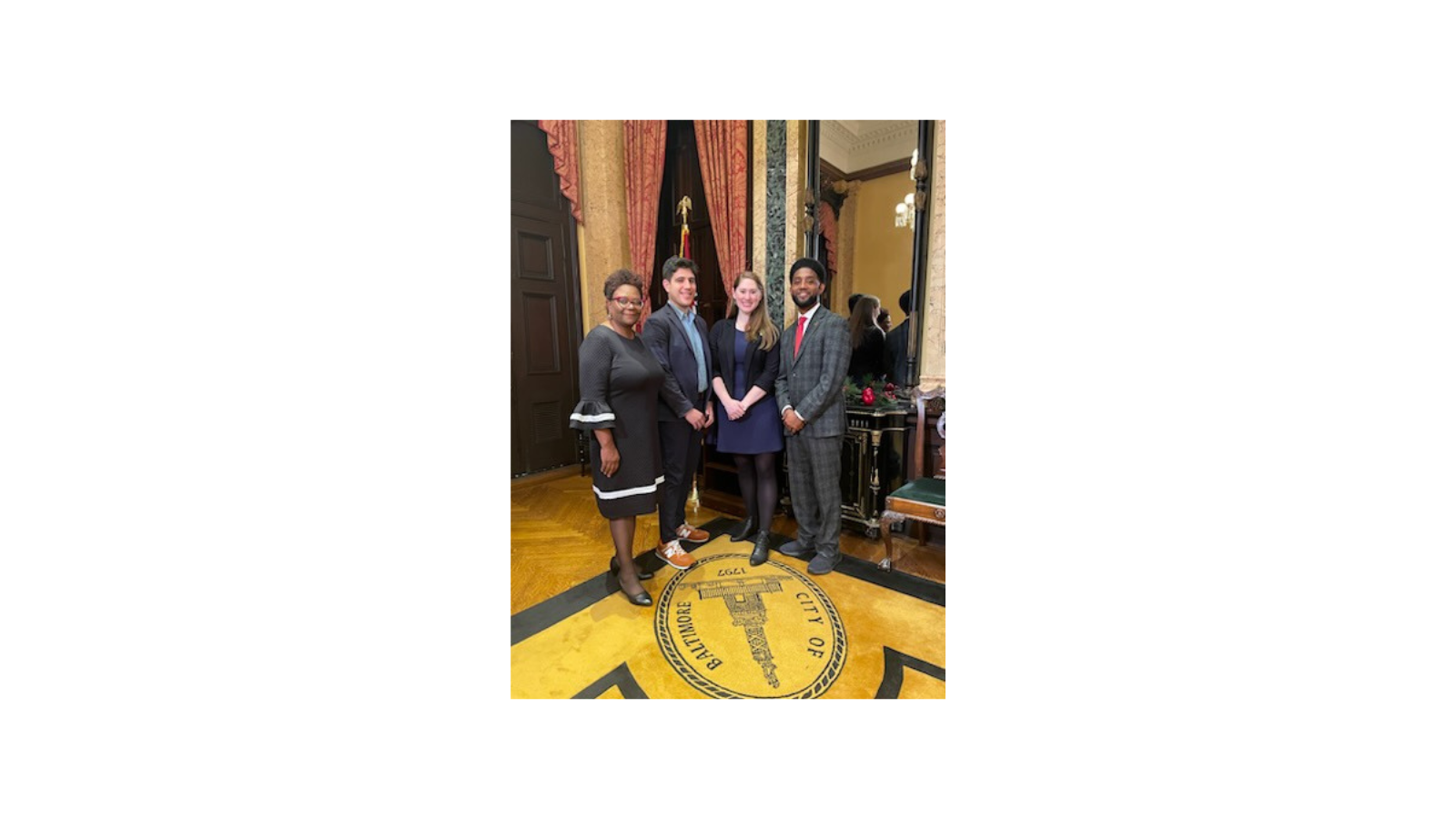Baltimore County Moves One Step Closer to Fair Elections
The Baltimore County Fair Election Fund Work Group recently released its recommendations for the Baltimore Fair Election Fund, a small donor public campaign financing program.
The Baltimore County Fair Election Fund Work Group recently released its recommendations for the Baltimore Fair Election Fund, a small donor public campaign financing program.
The process to bring Fair Elections to Baltimore County started back in 2019 when County Executive John Olszewski proposed a charter amendment to establish the Fair Elections Fund. Then, in November 2020, when Baltimore County residents voted in favor of Question A, a ballot question authorizing the County Council to create a public campaign financing program.
In order to finalize the program and fight the influence of big money in the political process, the County Council now needs to pass implementation policy. But what exactly is public campaign financing, and why is this such a big deal?
Why are these programs such a big deal?
Big money – the large donations that come from corporations, PACs, and wealthy individuals – dominates politics, including the elections for governor in Maryland. Due to the high cost of campaigning, people who want to run for office need to raise as much money as possible, as quickly as possible. As a result, the people and corporations that can write big checks are in the driver’s seat.
Since fundraising is an important part of running any successful campaign, access to money can filter out candidates that do not have personal wealth or connections to large donors. This magnifies the influence of the few people who can afford to give large contributions. As a result, big money plays an outsized role in determining not just who actually has the funds to win elections, but who can actually finance a run for office in the first place.
As candidates consider fundraising for an election, relationships with big donors can influence their decisions about what policies to promote, support, and ultimately vote for if elected. Elected officials may make decisions on vital issues that benefit the big donors that they need to maintain strong relationships with to win re-election instead of their constituents.
The impact of big money is a fundamental challenge to our democratic process. Democracy means one person, one vote. The amount of money you have should not determine the amount of political power and influence you have.
What are small donor public campaign financing programs?
Participating candidates for office can opt in to the program and commit to rejecting contributions from PACs and corporations. As proposed by the Baltimore County work group, they also cannot take over $250 from any single individual. In return, the small dollar contributions these candidates receive from Baltimore County residents will be matched by a public fund. The matching funds are tiered so that the smallest contributions receive the highest match, further incentivising small donations that more Baltimore County families can afford to make.
The Baltimore County Fair Election Fund Work Group made recommendations for how these contributions should be matched. The match rates for county executive candidates are $6 matched for each dollar of the first $50 of every contribution, $4 matched for the second $50, and $2 matched for the last $50. For county council, the match rates are $4 matched for each dollar of the first $50 of every contribution, $3 matched for the second $50, and $2 for the last $50.
For example, if the work group’s recommendations are adopted, a $100 contribution to a candidate running for county executive would be matched at a 6:1 ratio for the first $50, and a 4:1 ratio for the second $50. So, the total contribution would be 6 x $50 = $300 in matching funds for the first $50, 4 x $50 = $200 in matching funds for the second $50, and the original $100 donation total for a total of $600 from a $100 donation.
Okay, but how do these programs help fight big money?
Small donor public campaign financing programs empower voters and reduce the influence of large and corporate donors. Since these programs cap the maximum size of donations and match small contributions from constituents, they allow candidates for office to run a financially competitive campaign without having to rely on big money. Candidates can spend more time speaking with and listening to their constituents instead of hosting big money fundraising events, building more faith in the electoral process.
Since the program matches smaller donations at a higher rate, it ensures that small donations of $10 or $25 become more valuable to candidates who are trying to fundraise and win elections. Adding value to these small dollar contributions, which are much more affordable for ordinary Baltimore County residents, allows more people to meaningfully participate in political campaigns.
Where have these programs been implemented in Maryland?
In 2014, after authorization from the state, Montgomery County became the first community in the state to establish a small donor public financing system for local elections. Since then, Howard County, Prince George’s County, and Baltimore City have established similar programs. On the state level, the Maryland legislature passed the Maryland Fair Elections Act, which converted the previous public campaign finance system for the gubernatorial race to a small donor model.
Montgomery County ran their first election using the system in 2018, which showed promising results for the small donor public financing system’s ability to reduce the influence of big money in fundraising. Candidates who participated in the small donor program received over 96% more contributions from individuals than candidates who did not. Additionally, candidates qualifying for the program received an average contribution of $86 compared to $1,145 for non-participating candidates. These results show that small donor public campaign financing can effectively incentivize candidates for office to run based on support from their community instead of from big donors.
What are the next steps in Baltimore County?
After the work group’s recommendations, the next step is for the County Council to pass legislation enacting these recommendations into law so that future candidates in Baltimore County can use this program to run for office starting in 2026.
If you’re a Baltimore County resident, you can use our website to send a note to your county councilmember asking them to adopt the recommendations from the work group and support the Fair Election program.
Topics
Authors
Rishi Shah
Find Out More

Small donor public financing victory in Anne Arundel County

Anne Arundel County Considers Small Donor Public Financing

Mayor Scott swears in Fair Election Fund Commissioners

